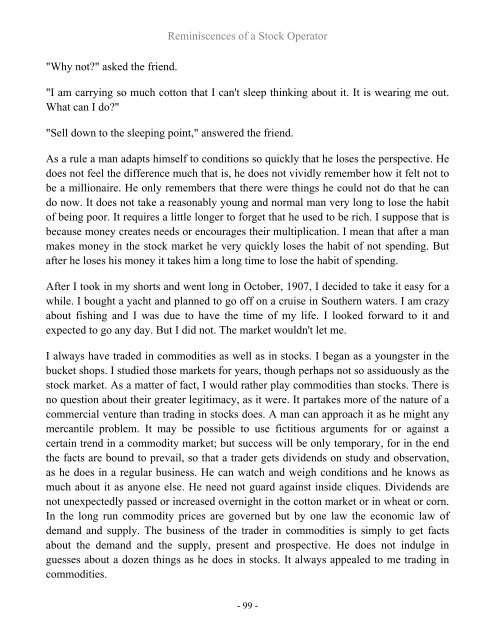You also want an ePaper? Increase the reach of your titles
YUMPU automatically turns print PDFs into web optimized ePapers that Google loves.
"Why not?" asked the friend.<br />
Reminiscences of a Stock Operator<br />
"I am carrying so much cotton that I can't sleep thinking about it. It is wearing me out.<br />
What can I do?"<br />
"Sell down to the sleeping point," answered the friend.<br />
As a rule a man adapts himself to conditions so quickly that he loses the perspective. He<br />
does not feel the difference much that is, he does not vividly remember how it felt not to<br />
be a millionaire. He only remembers that there were things he could not do that he can<br />
do now. It does not take a reasonably young and normal man very long to lose the habit<br />
of being poor. It requires a little longer to forget that he used to be rich. I suppose that is<br />
because money creates needs or encourages their multiplication. I mean that after a man<br />
makes money in the stock market he very quickly loses the habit of not spending. But<br />
after he loses his money it takes him a long time to lose the habit of spending.<br />
After I took in my shorts and went long in October, 1907, I decided to take it easy for a<br />
while. I bought a yacht and planned to go off on a cruise in Southern waters. I am crazy<br />
about fishing and I was due to have the time of my life. I looked forward to it and<br />
expected to go any day. But I did not. The market wouldn't let me.<br />
I always have traded in commodities as well as in stocks. I began as a youngster in the<br />
bucket shops. I studied those markets for years, though perhaps not so assiduously as the<br />
stock market. As a matter of fact, I would rather play commodities than stocks. There is<br />
no question about their greater legitimacy, as it were. It partakes more of the nature of a<br />
commercial venture than trading in stocks does. A man can approach it as he might any<br />
mercantile problem. It may be possible to use fictitious arguments for or against a<br />
certain trend in a commodity market; but success will be only temporary, for in the end<br />
the facts are bound to prevail, so that a trader gets dividends on study and observation,<br />
as he does in a regular business. He can watch and weigh conditions and he knows as<br />
much about it as anyone else. He need not guard against inside cliques. Dividends are<br />
not unexpectedly passed or increased overnight in the cotton market or in wheat or corn.<br />
In the long run commodity prices are governed but by one law the economic law of<br />
demand and supply. The business of the trader in commodities is simply to get facts<br />
about the demand and the supply, present and prospective. He does not indulge in<br />
guesses about a dozen things as he does in stocks. It always appealed to me trading in<br />
commodities.<br />
- 99 -


